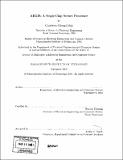| dc.contributor.advisor | Srinivas Devadas. | en_US |
| dc.contributor.author | Suh, Gookwon Edward, 1977- | en_US |
| dc.contributor.other | Massachusetts Institute of Technology. Dept. of Electrical Engineering and Computer Science. | en_US |
| dc.date.accessioned | 2006-11-07T12:24:40Z | |
| dc.date.available | 2006-11-07T12:24:40Z | |
| dc.date.copyright | 2005 | en_US |
| dc.date.issued | 2005 | en_US |
| dc.identifier.uri | http://hdl.handle.net/1721.1/34469 | |
| dc.description | Thesis (Ph. D.)--Massachusetts Institute of Technology, Dept. of Electrical Engineering and Computer Science, 2005. | en_US |
| dc.description | Includes bibliographical references (p. 225-240). | en_US |
| dc.description.abstract | Trust in remote interaction is a fundamental challenge in distributed computing environments. To obtain a remote party's trust, computing systems must be able to guarantee the privacy of intellectual property and the integrity of program execution. Unfortunately, traditional platforms cannot provide such guarantees under physical threats that exist in distributed environments. The AEGIS secure processor enables a physically secure computing platform to be built with a main processor as the only trusted hardware component. AEGIS empowers a remote party to authenticate the platform and guarantees secure execution even under physical threats. To realize the security features of AEGIS with only a single chip, this thesis presents a secure processor architecture along with its enabling security mechanisms. The architecture suggests a technique called suspended secure processing to allow a secure part of an application to be protected separately from the rest. Physical random functions provide a cheap and secure way of generating a unique secret key on each processor, which enables a remote party to authenticate the processor chip. | en_US |
| dc.description.abstract | (cont.) Memory encryption and integrity verification mechanisms guarantee the privacy and the integrity of off-chip memory content, respectively. A fully-functional RTL implementation and simulation studies demonstrate that the overheads associated with this single-chip approach is reasonable. The security components in AEGIS consumes about 230K logic gates. AEGIS, with its off-chip protection mechanisms, is slower than traditional processors by 26% on average for large applications and by a few percent for embedded applications. This thesis also shows that using AEGIS requires only minor modifications to traditional operating systems and compilers. | en_US |
| dc.description.statementofresponsibility | by Gookwon Edward Suh. | en_US |
| dc.format.extent | 240 p. | en_US |
| dc.format.extent | 14627357 bytes | |
| dc.format.extent | 14637497 bytes | |
| dc.format.mimetype | application/pdf | |
| dc.format.mimetype | application/pdf | |
| dc.language.iso | eng | en_US |
| dc.publisher | Massachusetts Institute of Technology | en_US |
| dc.rights | M.I.T. theses are protected by copyright. They may be viewed from this source for any purpose, but reproduction or distribution in any format is prohibited without written permission. See provided URL for inquiries about permission. | en_US |
| dc.rights.uri | http://dspace.mit.edu/handle/1721.1/7582 | |
| dc.subject | Electrical Engineering and Computer Science. | en_US |
| dc.title | AEGIS : a single-chip secure processor | en_US |
| dc.type | Thesis | en_US |
| dc.description.degree | Ph.D. | en_US |
| dc.contributor.department | Massachusetts Institute of Technology. Department of Electrical Engineering and Computer Science | |
| dc.identifier.oclc | 70717258 | en_US |
